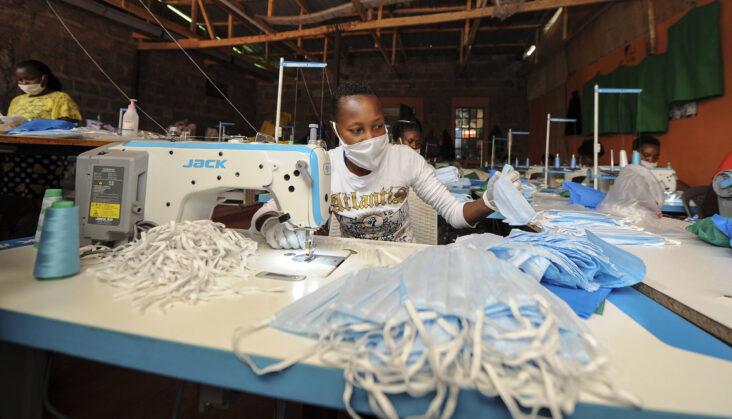Africa-Press – Lesotho. 50 African intellectuals including Kako Nubukpo, Alioune Sall, Carlos Lopes, Cristina Duarte, Felwine Sarr, Achille Mbembe, Reckya Madougou, Souleymane Bachir Diagne, Franck Hermann Ekra and Hakim Ben Hammouda co-signed this call to mobilize the intelligence, resources and creativity of Africans to defeat the COVID-19 pandemic.
Severe Acute Respiratory Ryndrome Coronavirus 2, (SARS-CoV-2), is the scientific name for the virus responsible for a highly contagious and potentially fatal respiratory disease.
Initially an epidemic and then reclassified as a pandemic by the WHO on 11 March 2020, its devastating effects are sowing death, plunging the most powerful economies into recession.
The virus could be a precursor to disastrous days ahead for the African continent and its inhabitants. Africa is not where this pandemic started, yet it is facing its harsh effects, through increasing human contagion and the sharp contraction of a significant part of essential social and economic activities.
The continent must therefore provide an essential, powerful and sustainable response to a real threat that should neither be exaggerated nor minimized, but rather tackled rationally.
The Malthusian prognosis, which is being used in this this pandemic for a thinly veiled speculation on the so-called excessive African demography, which is now the target of the new civilizers, must be defeated.
Disaster scenarios, considered all over the continent, could de facto have a negative impact on economies and risk assessments generally unfavorable to Africa prior to COVID-19, with investors in complete uncertainty.
The crisis is a historic opportunity for Africans to mobilize their resources that are spread spread over all continents – traditional, diasporic, scientific, new, digital, their creativity – to emerge stronger from a disaster that some have already predicted for them.
In the next few days we will exceed the 2 million mark of COVID-19 infections. The virus continues to spread with speed with the focus now turning to the readiness of health systems in African countries in the face of the virus.
The supply of health services, equipment, and qualified personnel, is now the source of all concern. The WHO has even recently called on African countries to “wake up” and “expect the worst”.
It should be recalled that Africa is, for the moment, the least impacted continent, with its first case confirmed in February 2020 in Egypt. Fears about the impatc of the virus on Africa so far, lack concrete and documented justifications.
Yes, local ecosystems, demographic factors, the mutated nature of the virus, the intensity of international traffic and other elements will limit the spread of the pandemic.
Though it remains hypothetical, it is also necessary to note the impact of several drastic measures decided by governments: closures of borders, schools, businesses and worship places.
Notwithstanding the stressful nature of the pandemic, local political contexts more generally lead to an eager social demand in search of efficiency. The observation of uneven public responses around the world and the relative unpredictability of the pandemic may explain a process of trial and error.
While the responsiveness of African countries remains varied, we must quite rightly acknowledge and remember the catastrophic effect of decades of structural adjustment on public health and health provision in African countries.
In spite of everything, many health systems have substantially evolved, driven by the determination to achieve the Sustainable Development Goals (SDGs) by 2030, notwithstanding the gaps to be filled and the obvious failures.
Depending on the country, the state of African health equipment is certainly unsatisfactory and health services are ill-equipped overall, but it would be wrong to portray non-existent health systems, paving the way for an inevitable decline.
Moreover, health care is often social and community-based, relying also on cultural ties that require solidarity and family management of disease. For these reasons, self-fulfilling prophecies cannot be justified.
Disaster scenarios, considered all over the continent, could de facto have a negative impact on economies and risk assessments generally unfavorable to Africa prior to COVID-19, with investors in complete uncertainty.
The coronavirus pandemic has given some Western chancelleries the opportunity to reactivate an Afro-pessimism that was thought to be from another age.
Health systems in Africa need to be totally revamped in the light of many current considerations and limitations. We should not wait for the possible breakdowns caused by a pandemic of this magnitude before acting diligently and effectively.
A number of actions should be taken: While COVID-19 brings economies to a standstill and disrupts the functioning of societies, it is paradoxically time for Africa to overcome its challenges and find a new place in the world.
Of course, the challenge we are facing is major because, in addition to our sluggish economies, the coronavirus pandemic has given some Western treasuries the opportunity to reactivate an Afro-pessimism that was thought to be from another age.
For More News And Analysis About Lesotho Follow Africa-Press






